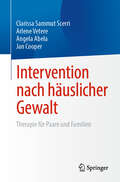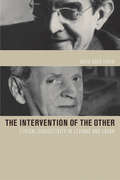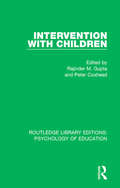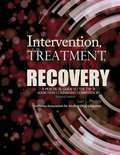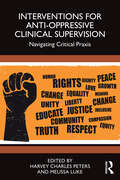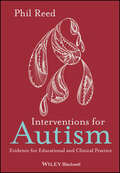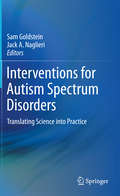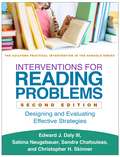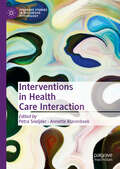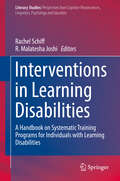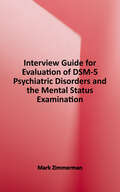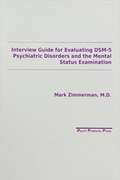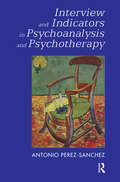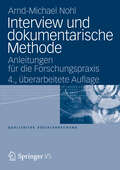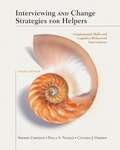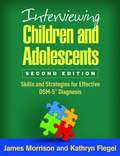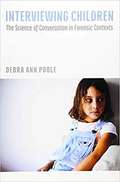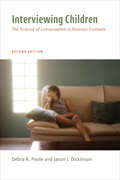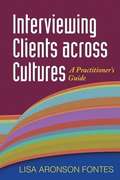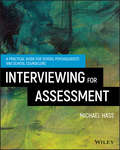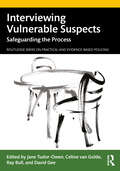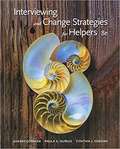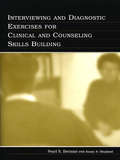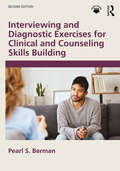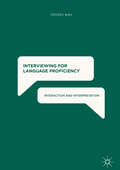- Table View
- List View
Intervention nach häuslicher Gewalt: Therapie für Paare und Familien
by Angela Abela Arlene Vetere Jan Cooper Clarissa Sammut ScerriDieses praxisbezogene Buch bietet eine professionelle Anleitung zur Beendigung häuslicher Gewalt in Paaren und Familien und zur Förderung von Heilung und Sicherheit in der Folgezeit. Die theoretische Vielfalt (Bindung, Trauma, Feminismus, Narrativität) und die Einbeziehung von Familienstrukturen und Gewaltformen ermöglichen es, sowohl komplexe Umstände zu verstehen als auch mit Familien zu intervenieren. Die Aufgaben der Heilung, von der Wiederherstellung des Vertrauens bis zur Förderung einer positiven Bewältigung, sind eindeutig mit den Auswirkungen des Missbrauchs verbunden, wie z. B. ungelöster Verlust, abgestumpfte Traumareaktionen, schlechte Emotionsregulierung und beschädigtes Beziehungswertgefühl. Und weil anhaltende Sicherheit für das Wohlbefinden entscheidend ist, erweitern die Autoren ihre Sicherheitskonzepte um die eigenen Erfahrungen, die Sicherheit und die Selbstfürsorge der Fachkräfte.Zu den behandelten Themen gehören:- Leben mit Gewalt in der Familie: Retrospektive Erinnerung an die Kindheitserfahrungen von Frauen.- Wie man der Gewalt Einhalt gebieten kann: Anwendung einer Sicherheitsmethodik über die gesamte Lebensspanne.- Paaren helfen, sich sicher zu trennen: Auf sichere Trennungen hinarbeiten.- Heilung und Reparatur in Beziehungen: Therapeutische Arbeit mit Paaren.- Systematische Arbeit mit Eltern, Kindern und erwachsenen Überlebenden, wenn der Missbrauch aufhört.- Supervision und Konsultation von Fachleuten, die mit Familien und Trauma zu tun haben. Dieses Buch ist ein unverzichtbares Hilfsmittel für Sozialarbeiter:innen und Fachleute für psychische Gesundheit, die in der klinischen Praxis tätig sind und Strategien für die therapeutische und systematische Arbeit mit Paaren und Familien suchen, die körperliche und emotionale Gewalt erlebt haben.
Intervention of the Other
by David Ross FryerThe Intervention of the Other deftly brings the thought of Emmanuel Levinas and Jacques Lacan into fruitful dialogue through a comparative analysis of these two seemingly disparate thinkers.Emmanuel Levinas, Lithuanian-born French phenomenologist of the nonphenomenon, and Jacques Lacan, controversial French psychoanalyst and (post)structuralist theorist of the Freudian Unconscious, lived and wrote in the same city, at the same time, among the same colleagues, often using the same language and the same sources, sometimes writing to the same audiencesóand yet they never wrote to or about one another. Following Sartre, Levinas thought that Freud had fundamentally misunderstood the nature of consciousness when he posited the Unconscious as a second, but hidden, consciousness. Despite this suspicion of psychoanalysis, however, Levinasí own work celebrated a certain something that could not be contained by thought. For his part, Lacan was suspicious of philosophical ethics. He subscribed to a Freudian critique of ethics as pathogenic. Nevertheless, he saw his own work as fundamentally about a kind of ethics, specifically an ethics concerned with how people live their lives in an already normative society.While the two never engaged with each otherís thought directly, Levinas and Lacan were interested in many of the same questions: What is the nature of the self? What is it to be a subject? Can the ethical be grounded in a post-foundationalist world?Through close textual analysis, David Ross Fryer shows how Levinas and Lacan offer two ways of positing the ethical subject in the post-humanist landscape of contemporary thought.
Intervention with Children (Routledge Library Editions: Psychology of Education)
by Rajinder M. Gupta Peter CoxheadEducational psychologists, psychiatrists, social workers, and other professionals are often asked by parents or teachers to intervene when ‘normal’ classroom strategies have failed children in their charge. This title, originally published in 1990, brought together for the first time some of the ‘intervention strategies’ available at the time and offers professionals vital information about the results of each strategy in practice. The contributors, acknowledged experts in their fields, present a critical and objective overview of the range of approaches available and apply them to the areas of poor school attendance, maladaptive behaviour, and poor reading levels. They stress the need to avoid replacing a traditional approach with an intervention strategy whose results are unproven. They also warn that different problems demand different approaches and that the consultant must avoid the dogmatic application of a single approach when the child’s welfare is at risk. The need for consultants to deal sensitively with the professionals they are asked to advise is also emphasized. Teachers may feel, for example, that an educational psychologist is out of touch with the realities of teaching. Above all else, interventions should offer realistic and effective methods of improving children’s lives. Intervention with Children provides in one volume practical, effective, and acceptable strategies for working with children. Educational psychologists, LEA advisers, researchers, and other professionals will still find it a valuable source of ideas and a model of good practice from which to develop their own intervention strategies. Written in a clear and accessible style, it will still be of interest to experienced teachers, social workers, and others involved in the management and care of children.
Intervention, Treatment and Recovery: A Practical guide to the Tap 21 Addiction Counselling Competencies
by Lori L. PhelpsIntroduction to the Tap; Trans disciplinary Foundation I: Understanding Addiction; Trans disciplinary Foundation II:Treatment Knowledge; Trans disciplinary Foundation III: Application to Practice; Trans disciplinary Foundation IV: Professional Readiness; Practice Dimension I: Clinical Evaluation; Practice Dimension; Practice Dimension III; Practice Dimension IV; Practice Dimension V; Practice Dimension VI: Client, Family, and Community Education; Practice Dimension VII: Documentation; Practice Dimension VIII: Professional and Ethical Responsibilities.
Interventions for Anti-Oppressive Clinical Supervision: Navigating Critical Praxis
by Melissa Luke Harvey Charles PetersInterventions for Anti-Oppressive Clinical Supervision reimagines the current landscape of clinical supervision training and praxis by offering 50 transformative interventions grounded in the principles of anti-oppression.Designed for interdisciplinary mental health professionals across roles and contexts, it provides dynamic tools to dismantle systems of oppression and embrace liberatory, intersectional approaches to supervision. More than a resource, this book inspires a paradigm shift by blending theory, research, and praxis to cultivate critical reflexivity, critical consciousness, and collaboration.This book provides readers with the foundation to create brave supervision spaces and processes that foster healing, equity, and personal to societal change, setting a new standard for liberating mental health professionals and their communities.
Interventions for Autism
by Phil ReedProviding a vital link between theory and practice, this unique volume translates the latest research data on the effectiveness of interventions for Autism Spectrum Disorder (ASD) into practical guidance for education professionals working with ASD pupils. Reformulates new research data on interventions for ASD into guidance for professionals, drawing on the author's in-depth academic knowledge and practical experience Offers a comprehensive review of up-to-date evidence on effectiveness across a wide range of interventions for ASD Focuses on environmental factors in understanding ASD rather than outdated 'deficit' approaches, and discusses key issues in education provision such as inclusion
Interventions for Autism Spectrum Disorders
by Sam Goldstein Jack A. NaglieriChildren are being diagnosed with autism spectrum disorders at a staggering rate--as many as one in 110, according to some studies. To this sobering statistic add the familiar figures of the toddler disengaged from his peers, the middle schooler shunned in the lunchroom, and the adult struggling with social cues on the job, and professionals are faced with a mounting challenge: to assist and support young people with these disorders to ensure their successful transition to adolescence and adulthood. The first volume dedicated solely to its topic, Interventions for Autism Spectrum Disorders provides a comprehensive overview of programs currently in use. Contributors explore programs focusing on long-term outcomes, home- and classroom-based strategies, resilience training for parents, and pharmacological management of symptoms. Background chapters review issues in reliability and validity of interventions and evaluating treatment effectiveness. And an especially cogent chapter discusses the centrality of treatment integrity to best practice. Comprehensive programs and targeted interventions covered include: The Early Start Denver Model for young children.The TEACCH program for children, adults, and families.The Center for Autism and Related Disorders (CARD) and CARD eLearning.PROGress: a program for remediating and expanding social skills.Evidence-based strategies for repetitive behaviors and sensory issues.Self-regulation strategies for students with autism spectrum disorders.Interventions for Autism Spectrum Disorders is an essential resource for researchers, professionals/practitioners, and clinicians in a wide array of fields, including clinical child, school, and developmental psychology; child and adolescent psychiatry; education; rehabilitation medicine/therapy; social work; and pediatrics.
Interventions for Reading Problems, Second Edition
by Christopher H. Skinner Sabina Neugebauer Sandra Chafouleas Edward J. Daly IIIThis user-friendly guide has been thoroughly revised to reflect significant changes in the way schools deliver reading instruction and intervention, especially for students at risk for reading failure. Step-by-step strategies target key areas of literacy development: phonological awareness, fluency, and comprehension. Particular emphasis is placed on scientifically based practices that do not require major curricular change and can be applied with students of varying ages and ability levels. In a large-size format with lay-flat binding for ease of photocopying, the book includes 17 reproducible assessment and instructional tools. Purchasers also get access to a Web page where they can download and print the reproducible materials. New to This Edition: *Chapter on multi-tiered intervention delivery, plus additional discussion in other relevant chapters. *Chapter on interventions for English learners (ELs). *Chapter on vocabulary instruction, intervention, and assessment. *Additional graphing and data-analysis tools. *Coverage of new resources available through federal supports. This book is in The Guilford Practical Intervention in the Schools Series.
Interventions in Health Care Interaction (Palgrave Studies in Discursive Psychology)
by Petra Sneijder Annette KlarenbeekThis edited collection presents the latest work on the application of discursive psychology and conversation analysis to sensitive interactions and interventions in healthcare. While all interactions in healthcare settings can be challenging for both patients and practitioners, this book pays particular attention to topics that are likely to be especially sensitive, such as communication around sexual health, palliative care, suicide prevention, medically unexplained symptoms, or chronic pain. Across nine chapters authors discuss how discursive psychology and conversation analysis can help us understand what people actually do in conversations, hence providing a strong basis for developing and testing training methods that support health professionals to reflect on their interactions with patients. Addressing both practical and theoretical challenges in the development and implementation of such training sessions, this volume establishes the state-of-the-art in this area and offers a valuable tool for academics and researchers in discourse analytical fields, practitioners working to improve communication in health, as well as meeting facilitators in education or work settings related to healthcare.
Interventions in Learning Disabilities
by Rachel Schiff R. Malatesha JoshiThis book reviews systematic training programs that are designed to enhance the language, reading, literacy and cognitive skills of individuals with Learning Disabilities in various disciplines. Most titles on Learning Disabilities intervention often focus on the linguistic area of the disability, while there are many more areas of difficulty. Students with learning disabilities struggle with such as math, cognitive abilities, and organizational skills. Adopting a multi-disciplinary approach, this book encompasses a wide variety of remedial treatments and therapies developed by expert researchers and scholars in the Learning Disabilities area.
Interview Guide For Evaluating DSM-5-TR Psychiatric Disorders and the Mental Status Examination
by Mark ZimmermanThis book provides questions for evaluating psychiatric disorders. DSM-5-TR lists the disorders and their criteria, but it does not guide the beginner in inquiry for them. Students and clinicians in training are relatively unfamiliar with psychiatric diagnoses, and they cannot possibly remember all of the disorders and their corresponding diagnostic criteria within a short period of study. Moreover, it is often not obvious what questions to ask to determine the symptom's presence. How do you inquire for thought withdrawal, delusions of reference, panic attacks, obsessions, identity disturbance, mood instability, etc., Even more basic, how do you begin the interview? The Interview Guide consists of questions for the most common DSM-5 diagnoses including personality disorders. This book is not a standardized interview, to be started on page x and followed until page xx. Rather it is a quick reference to be used in the context of a clinical interview. If a patient complains of depression, the interviewer can turn to the section on major depression and assess the relevant symptoms. The book is organized by diagnosis and contains 9 sections.
Interview Guide for Evaluating DSM-5 Psychiatric Disorders and the Mental Status Examination
by Mark Zimmerman<p>This book provides questions for evaluating psychiatric disorders. DSM-5 lists the disorders and their criteria, but it does not guide the beginner in inquiry for them. Students and clinicians in training are relatively unfamiliar with psychiatric diagnoses, and they cannot possibly remember all of the disorders and their corresponding diagnostic criteria within a short period of study. Moreover, it is often not obvious what questions to ask to determine the symptom's presence. How do you inquire for thought withdrawal, delusions of reference, panic attacks, obsessions, identity disturbance, mood instability, etc? Even more basic, how do you begin the interview? <p>The Interview Guide consists of questions for the most common DSM-5 diagnoses including the personality disorders. This book is not a standardized interview, to be started on page x and followed until page xx. Rather it is a quick reference to be used in the context of a clinical interview. If a patient complains of depression, the interviewer can turn to the section on major depression and assess the relevant symptoms. If there is a suggestion of excessive drug or alcohol use, the interviewer can refer to the long list of questions for diagnosing a drug or alcohol use disorder.</p>
Interview and Indicators in Psychoanalysis and Psychotherapy
by Antonio Perez-SanchezThe book deals with initial interviews in psychoanalysis and psychotherapy, suggesting the idea of special "indicators". These indicators relate to three main areas. Firstly, psychoanalytical understanding of initial interviews to evaluate the patient's suitability for a psychoanalytically based treatment, discussing the dynamics, aims and technique of the interview. Three areas to be explored in the interview are considered: psychopathological data; biographical data, and data arising from the interaction of the patient with the therapist in the interview itself. Secondly, part of the book is devoted to the definition and description of what the author calls "indicators" for the therapist to build a personality profile showing suitability for psychoanalytic treatment. The main theoretical bases of the book are Freud, Klein and Bion. A third part deals with the controversial issue of the differentiation between psychoanalysis and psychoanalytic psychotherapy. The specificity of psychoanalysis is defined in comparison with psychotherapy. A specific psychoanalytic method and setting may be created as well as a specific psychotherapeutic method and setting.
Interview und dokumentarische Methode
by Arnd-Michael NohlDie dokumentarische Methode ist eine Methodologie der qualitativen Sozialforschung, die sich in der Forschungspraxis bewährt hat. In dieser Neuauflage wird umfassend theoretisch begründet und forschungspraktisch gezeigt, wie mit dieser Methode Interviews ausgewertet werden. Dabei wird dem narrativen Charakter von Interviews, seien diese leitfadengestützt oder biographisch angelegt, besonders Rechnung getragen. Neben der formulierenden und reflektierenden Interpretation der Interviews geht es um deren Vergleich und um die sinn- wie soziogenetische Typenbildung. Das Buch zeigt methodologische Hintergründe der dokumentarischen Interpretation narrativ fundierter Interviews auf, ist mit seinen ausführlichen Forschungsbeispielen vor allem aber eine Anleitung für die Forschungspraxis.
Interviewing And Change Strategies For Helpers: Fundamental Skills And Cognitive Behavioral Interventions
by Sherry Cormier Cynthia J. Osborn Paula S. NuriusThis respected text skillfully combines evidence-based interviewing skills and cognitive-behavioral intervention change strategies applicable to a wide range of client ages, cultural backgrounds, and problems in living. The book interweaves attention to conceptual and empirical foundations with an emphasis on practical skills and real-life factors in contemporary settings with diverse clientele. Long commended for its synthesis of up-to-date professional knowledge with case models, learning activities, and guided feedback, INTERVIEWING AND CHANGE STRATEGIES FOR HELPERS: FUNDAMENTAL SKILLS AND COGNITIVE BEHAVIORAL INTERVENTIONS, Sixth Edition, features a new streamlined and reader-friendly design, as well as essential new information on vital topics such as ethics, critical thinking, client resistance, exposure therapy, the helping relationship, and recent developments in cognitive behavior therapy. These valuable additions complement a proven instructional format focusing on essential knowledge, skills, values, and tools needed by today's professional helpers.
Interviewing Children and Adolescents: Skills and Strategies for Effective DSM-5 Diagnosis (Second Edition)
by James Morrison Kathryn FlegelThis instructive clinical resource has given thousands of clinicians and students essential skills for evaluating infants through adolescents with any type of mental health issue. Principles for conducting age-appropriate clinical interviews with children of varying ages and their parents--including the use of toys, drawing, dolls, and other forms of play--are illustrated with annotated sample transcripts. The book provides crucial information for accurately diagnosing a wide range of mental and behavioral disorders. User-friendly features include concise explanations of diagnostic criteria, coding notes, interview pointers for specific disorders, vivid vignettes, and a sample written report.
Interviewing Children: The Science of Conversation in Forensic Contexts
by Debra Ann PooleBecause of children’s incomplete language development, their greater risk of retrieving inaccurate information in response to memory cues, and their desire to say what they think the interviewer wants to hear (whether truthful or not), child eyewitness testimony can be unreliable. <p><p> In this book, Debra Ann Poole presents a flexible, evidence-based approach to interviewing children that reduces the ambiguities and errors in children’s responses. <p><p> Through her descriptions of best practices, brief summaries of supporting research, and example interview dialogs, Poole provides a roadmap for anyone working in a forensic context. <p><p> This book is essential reading for those who interview children, supervise interviewers, review interview findings, or craft local policies about interviewing children.
Interviewing Children: The Science of Conversation in Forensic Contexts
by Dr. Debra Ann Poole PhD Dr. Jason J. DickinsonInterviewing Children is an accessible guide for forensic interviewers, clinicians, attorneys, and other professionals who rely on children&’s testimony. In this second edition, Poole and Dickinson present new thematic chapters on conversation habits, conventional content, and protocols for training.Highlights include: Sample dialogues that help flesh out and illustrate research-based recommendations for practice quick guides that synthesize core ideas and skills "Principles to Practice" sections that answer questions about child interviewing; and a comprehensive appendix of learning activities readers can use to sharpen their interviewing skills. The primary goal of all conversations with child witnesses is to help children describe events in their lives as completely, accurately, and unambiguously as they can. But common obstacles can make this task difficult, if not impossible. Interviewing Children offers a comprehensive look at the science of conversation with children in forensic contexts and provides the research-based tools and practices for navigating these obstacles.
Interviewing Clients across Cultures
by Lisa Fontes Sandra Graham-BermannPacked with practical pointers and examples, this indispensable, straight-talking guide helps professionals conduct productive interviews while building strong working relationships with culturally and linguistically diverse clients. Chapters cover verbal and nonverbal ways to build rapport and convey respect; how to overcome language barriers, including effective use of interpreters; culturally competent interviews with children and adolescents; and key issues in working with immigrants and refugees. Strategies for avoiding common cross-cultural misunderstandings and producing fair, accurate reports are presented. Every chapter concludes with thought-provoking discussion questions and resources for further reading.
Interviewing For Assessment: A Practical Guide for School Psychologists and School Counselors
by Michael HassAn indispensable guide for school psychologists and school counselors on assessment interviewing Assessment Interviewing is a collaborative, strengths-based approach to the subject that helps professionals develop the skills and knowledge necessary to effectively gather the information they need in order to assess children's social, emotional, and academic functioning. Practical and easy to read, it provides step-by-step guidelines for structuring interviews for different purposes, communicating respect and understanding, and strategies for gathering information from children of different ages, cultures, and social standings. Chapter contains case studies and examples that illustrate how to clarify and classify problems, understand strengths and resources, appreciate the role of culture in interviews and respond to risk of suicide. The book concludes with a chapter on how to communicate the key information gathered into a comprehensive assessment or intervention plan. Addresses the unique interviewing needs of school-based professionals Features numerous practice exercises Provides strategies and guidelines for integrating the information gathered from interviews into a comprehensive assessment or intervention plan Includes interview protocols and end-of-chapter checklists This book is an ideal resource for school-based practitioners and graduate courses in assessment, counseling, and seminars attached to fieldwork.
Interviewing Vulnerable Suspects: Safeguarding the Process (Routledge Series on Practical and Evidence-Based Policing)
by Jane Tudor-Owen, Celine van Golde, Ray Bull, and David GeeThis book is an in-depth, evidence-based guide to interviewing suspects with specific vulnerabilities. It provides an overview of current research, practices, and legal considerations for interviewing vulnerable suspects, incorporating guidelines regarding the identification of vulnerabilities, engaging with third parties in the interview, and training and supervision. It then goes on to cover specific vulnerabilities typically encountered in suspect populations, providing clear summaries of current research, case studies, and practical guidance for conducting interviews with these populations to facilitate best practice in interviewing. Expertise is drawn from both law enforcement practice and academic research to ensure an evidence-based approach that is relevant for contemporary practice. Interviewing Vulnerable Suspects offers the international policing audience a practical guide to interviewing vulnerable suspects for both uniform police and detectives. It is relevant for statutory bodies involved in investigations of misconduct; legal practitioners and forensic psychologists; practitioners in counselling, social work, and psychology; and students in policing, criminology, and forensic psychology programs.
Interviewing and Change Strategies for Helpers (Mindtap Course List)
by Sherry Cormier Cynthia J. Osborn Paula S. NuriusFully updated to reflect the latest research and issues, INTERVIEWING AND CHANGE STRATEGIES FOR HELPERS, Eighth Edition introduces you to the knowledge, skills, values, and tools needed by today's professional helpers. The book's conceptual foundation reflects four critical areas for helpers: core skills and attributes, effectiveness and evidence-based practice, diversity issues and ecological models, and critical commitments and ethical practice, using an interdisciplinary approach that reflects the authors' extensive experience in the fields of counseling, psychology, social work, and health and human services. The text skillfully combines evidence-based interviewing skills and evidence-based intervention change strategies, thus preparing you to work with clients representing a wide range of ages, cultural backgrounds, and challenges in living.
Interviewing and Diagnostic Exercises for Clinical and Counseling Skills Building
by Pearl S. Berman WITH Susan Shopland Susan N. ShoplandThis book, specifically designed to meet the needs of those teaching and learning interviewing and diagnostic skills in clinical, counseling and school psychology, counselor education, and other programs preparing mental health professionals, offers a rich array of practical, hands-on, class- and workshop-tested role-playing and didactic exercises.The authors, who bring to their task a combined 31 years of practice and 24 years of teaching these skills, present 20 complex profiles of a broad range of clients--adults, teens, and children; differing in ethnicity, gender, religion, socioeconomic status, presenting problems, and problem severity. The profiles provide students/trainees with a wealth of information about each client's feelings, thoughts, actions, and relationship patterns on which to draw as they proceed through the different phases of the intake/initial interview, one playing the client and one the interviewer. Each client profile is followed by exercises, which can also be assigned to students not participating in role-playing who have simply read the profile.The profiles are detailed enough to support a focus on whatever interviewing skills an instructor particularly values. However, the exercises highlight attending, asking open and closed questions, engaging in reflective listening, responding to nonverbal behavior, making empathetic comments, summarizing, redirecting, supportively confronting, and commenting on process. The authors' approach to DSM-IV diagnoses encourages students to develop their diagnostic choices from Axis I to Axis V and then thoughtfully review them in reverse order from Axis V to Axis I to ensure that the impacts of individual, situational, and biological factors are all accurately reflected in the final diagnoses. Throughout, the authors emphasize the importance of understanding diversity and respecting the client's perceptions--and of reflecting on the ways in which the interviewer's own identity influences both the process of interviewing and that of diagnosis.Interviewing and Diagnostic Exercises for Clinical and Counseling Skills Building will be welcomed as a invaluable new resource by instructors, students, and trainees alike.
Interviewing and Diagnostic Exercises for Clinical and Counseling Skills Building
by Pearl S. BermanThis text is specifically designed to meet the needs of those teaching and learning interviewing and diagnostic skills in clinical, counselling, and school psychology, counselor education, licensed clinical social workers, and other programs preparing mental health professionals.It offers a rich array of practical, hands-on, class- and workshop-tested role-playing and didactic exercises. The profiles included throughout provide students/trainees with a wealth of information about each client's feelings, thoughts, actions, and relationship patterns on which to draw as they proceed through the different phases of the initial interview, one playing the client and one the interviewer. Each client profile is followed by exercises thathighlight attending, asking open and closed questions, engaging in reflective listening, responding to nonverbal behavior, making empathetic comments, summarizing, redirecting, supportively confronting, and commenting on process. This second edition is based on the new diagnostic system (DSM-5-TR) and all profiles and case examples are updated. Throughout, the author emphasizes the importance of understanding diversity and respecting the client's perceptions, and of reflecting on the ways in which the interviewer's own identity influences both the process of interviewing and that of diagnosis.This text is essential for both students and practitioners of clinical psychology, counselling, psychiatry, nursing, social work, and other allied professions.
Interviewing for Language Proficiency
by Steven J. RossThis book analyses oral proficiency interviews, a mainstay of second language speaking proficiency assessment for several decades. Adopting a mixed-method perspective involving micro-analytic approaches, discourse analysis and quantitative methods such as multi-level modeling and event history analysis, the author focuses on interaction and discourse processes common in language assessment interviews. This innovative book will appeal to students and scholars of language assessment, conversation and discourse analysts, as well as practitioners and providers of oral proficiency assessment.
